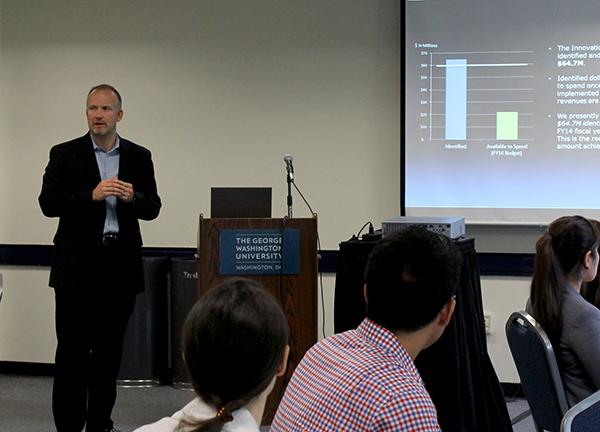GW will not unveil a new round of cost-saving ideas through the Innovation Task Force this month, marking the first semester that the program has not vetted programs to boost the University’s bottom line since its launch five years ago.
Instead, administrators plan to focus on implementing the ideas that they haven’t yet brought to fruition, Provost Steven Lerman said in an interview this week. With more than 70 ideas already in the pipeline, GW will be able to reach its goal of identifying $60 million in new revenue or savings by next year, he said.
Still, just $27 million was ready to put back into the GW’s budget this year.
“We had accumulated a lot of ideas and there was a danger of having so many ideas that you can’t follow through on all of them,” Lerman said. “It was a good time to do some consolidation and to really move some of the ideas that were in process faster to implementation.”
Dave Lawlor, who led the program since its inception, stepped down in October to take a position at the University of California, Davis. Lerman said Lawlor had suggested not to introduce another round of ideas before he left.
Since the program’s launch, the University has held an event each semester to present the newest phase of ideas, and Lerman said that Lawlor’s departure made it an “even better decision” not to hold a round this fall.
With each new phase, it had become more challenging for officials to introduce more sweeping plans. The first round created the most cost savings in the program’s history, and each subsequent round has saved less money for the University.

GW has introduced contests for students, faculty and staff to earn scholarships and other prizes for pitching the best cost-saving ideas. Last spring, two students earned $50,000 scholarships for their ideas, which were included in the most recent phase.
Some ITF initiatives, like launching new programs for student veterans, have taken a few years to get off the ground, while others, like giving up apartments at Columbia Plaza, were realized within a semester.
Meghan Chapple, the director of the Office of Sustainability, was named the ITF’s new co-chair in October. Before leading the task force, she had championed one of its ideas: launching a certificate program for students looking to work in the sustainability field.
“New ideas are continually accepted through the established programs, and new initiatives will be announced next semester,” she said in a statement.
University President Steven Knapp launched the project to allow GW to hire new faculty and offer financial aid from a new source of funding, rather than dipping into the endowment annually.
But the University scaled back its expectations for the ITF last year. Officials had overestimated how much money would be pulled in through the initiative, and they decided not to count $25 million as new funds for GW.
Members of the Faculty Senate were last briefed on the task force’s progress in spring 2013, and many members said they hadn’t recently received any updates.
“My understanding is they have been successful, but I’m not really sure what specific ideas have been successful or what ideas are in the pipeline,” said Charles Garris, the chair of the senate’s executive committee.
Colleen Murphy contributed reporting.







